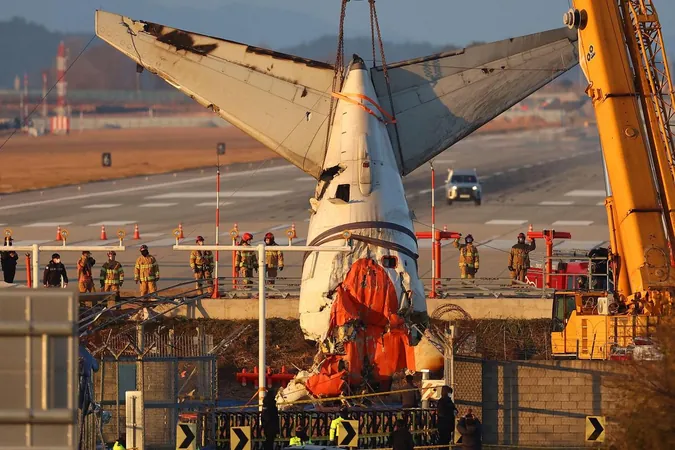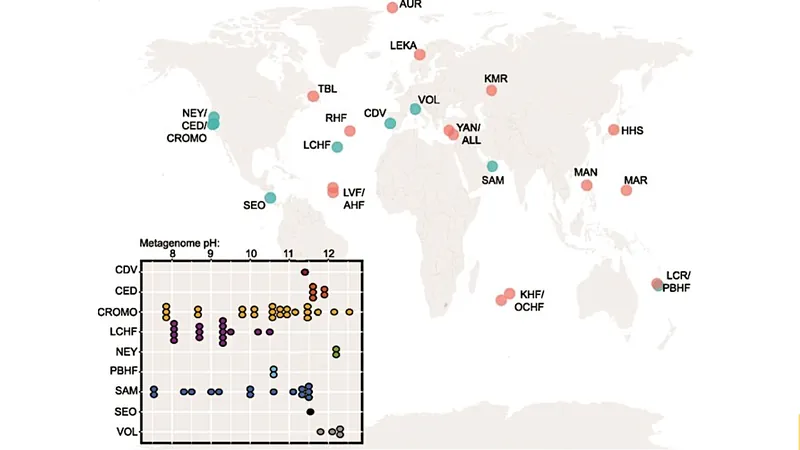
Boeing 737-800s in Singapore Cleared After Jeju Air Tragedy; What’s Next for Aviation Safety?
2025-01-08
Author: Ming
Introduction
In light of the tragic Jeju Air crash that claimed 179 lives last December, Singapore's transport authorities have conducted thorough checks on the Boeing 737-800 fleet operating in the country. Transport Minister Chee Hong Tat announced on January 8 that no issues were identified, reassuring the public about the reliability and safety of these aircraft.
The Jeju Air Incident
The incident involved a Jeju Air flight that collided with navigational equipment at Muan International Airport in South Korea on December 29, 2024. The catastrophic accident, which is considered the deadliest aviation disaster in South Korean history, raised critical safety questions. Minister Chee confirmed that Singapore's airports do not have similar concrete structures near runways, as all air navigation equipment is designed to detach upon impact, minimizing potential risks.
Proactive Measures for Aviation Safety
While responding to inquiries from Parliament, particularly from MP Ang Wei Neng, Mr. Chee outlined Singapore’s proactive measures to enhance aviation safety following such incidents. The Civil Aviation Authority of Singapore (CAAS) remains in close contact with aviation authorities in South Korea, the US Federal Aviation Administration, and Boeing to gather more data about the crash while assessing its implications for safety protocols in Singapore.
Preliminary Investigations
Preliminary investigations into the Jeju Air disaster suggest several potential causes, including a bird strike and malfunctioning landing gear, though the exact reason remains undetermined. The head of the investigation team stated on January 7 that it is premature to reach a conclusion; however, initial findings indicate bird strikes may have impacted at least one engine, resulting in an emergency landing attempt.
Current Status of Boeing 737-800s in Singapore
As of November 2024, Singapore has registered seven Boeing 737-800 aircraft operated primarily by Singapore Airlines, stemming from its former subsidiary SilkAir. Recent updates indicate two of these jets have been retired, and by March 2025, another B737-800 will be phased out, leaving a total of four aircraft in the fleet.
Changi Airport's Capacity
On a broader note, the urgency of assessing Changi Airport's capacity cannot be underestimated. Between January and November 2024, Changi welcomed approximately 61 million passengers, representing around 70% of its 90 million annual capacity. Mr. Chee projects that passenger traffic will likely return to pre-pandemic levels in 2024 and is expected to surpass those figures by 2025.
Investment in Infrastructure and Manpower
To accommodate this growth, Changi Airport Group has committed $3 billion over the next six years to enhance services such as baggage handling and check-in operations. Moreover, CAAS is conducting a manpower study focusing on attracting and retaining skilled workers in the aviation sector, paving the way for sustainable future growth.
Conclusion
As the aviation industry gradually rebounds, the lessons learned from the Jeju Air incident will be crucial in shaping stringent safety measures, not just in Singapore, but globally. The push for enhanced protocols could lead to a renewed focus on technological advancements designed to minimize risk factors in air travel, ensuring that safety remains a top priority. Stay tuned for updates on this ongoing situation, and keep an eye on how these developments could reshape the future of aviation safety!






 Brasil (PT)
Brasil (PT)
 Canada (EN)
Canada (EN)
 Chile (ES)
Chile (ES)
 Česko (CS)
Česko (CS)
 대한민국 (KO)
대한민국 (KO)
 España (ES)
España (ES)
 France (FR)
France (FR)
 Hong Kong (EN)
Hong Kong (EN)
 Italia (IT)
Italia (IT)
 日本 (JA)
日本 (JA)
 Magyarország (HU)
Magyarország (HU)
 Norge (NO)
Norge (NO)
 Polska (PL)
Polska (PL)
 Schweiz (DE)
Schweiz (DE)
 Singapore (EN)
Singapore (EN)
 Sverige (SV)
Sverige (SV)
 Suomi (FI)
Suomi (FI)
 Türkiye (TR)
Türkiye (TR)
 الإمارات العربية المتحدة (AR)
الإمارات العربية المتحدة (AR)